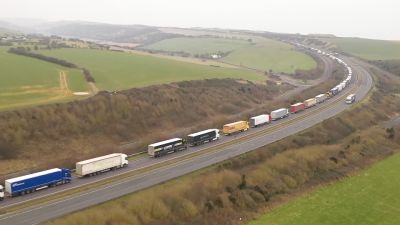Insight
New Brexit border checks causing queues at Dover and delays will get worse, says union

The Unite union says the queues of lorries outside the town of Dover are a “direct consequence” of the introduction of additional border procedures at the beginning of the year.
Hauliers transporting goods from the UK to the EU now have to use the Goods Vehicle Movement System (GVMS) - the government’s new IT portal - to obtain customs clearance at ports.
Unite estimates that checking drivers’ paperwork at the terminal is adding around 10 minutes to boarding times for every vehicle, causing severe delays.
The union says the problem is “particularly acute” at the Port of Dover.
Since the New Year, the port has repeatedly reached capacity and been forced to use the A20, which runs between Dover and Folkestone, as an overflow facility for lorries.
A four-mile queue of lorries on the A20 on Wednesday
At the Port of Dover’s request, Highways England has activated the Traffic Action Protocol, which permits the use of one lane of the A20 for port-bound traffic, on 15 occasions since January 8.
Adrian Jones, Unite’s national officer for road transport, said: “The fact the GVMS system has been in place for nearly a month is especially alarming because it suggests this is not initial teething problems but the new normal.
“Drivers fear the problems are only going to get worse, not better, as tourism returns to normal and trade pick up. Delays are only going to get longer.”
Queues on the A20 on Tuesday stretched from Dover to Folkestone
The Goods Vehicle Movement System (GVMS) system was introduced on January 1 to reduce the risk of delays at the border.
“(GVMS) is basically a wallet for all of the paperwork exporters need to cross the border, including customs declarations, safety and security documents and transit forms,” explains Sam Lowe, a trade specialist at Flint Global.
“The system is designed to minimise the compliance procedure but it is still more burdensome than it was before Brexit, when there was no compliance.”
Adrian Jones, from Unite trade union, was asked if he agreed with the government that the traffic queues in Dover are not caused by the new border checks
The queues on the A20 are also worrying the operator of Eurotunnel, the Port of Dover’s competitor.
“Operation TAP is an emergency truck traffic holding protocol,” says John Keefe, Director of Public Affairs at Getlink Group.
“We are surprised and concerned that it has been deployed so often this month. January is typically a lower traffic time of year.
“On a couple of occasions recently, the back of the TAP queue has reached Folkestone, displacing the congestion into the town and threatening to block access to our terminal.”
The government insists the queues at Dover have nothing to do with Brexit.
On Wednesday morning, Transport Minister Baroness Vere told the Transport Select Committee that ferry maintenance was to blame for the congestion.
“(The queues) are actually due to the fact that there are three ships being refitted at the moment,” she said.
“That is why Dover TAP is currently on. Our view is that the delay in Dover is not due to border checks.”
Baroness Vere told the Transport Select Committee on Wednesday queues at Dover are not related to border checks, and are caused by another issue
That explanation was treated with cynicism by a source I spoke to, who is closely involved in Brexit-related contingency planning in Kent.
“Of course Brexit is a factor,” the source told me. “(The government) is just trying to cover this up.
"If the queues on the A20 continue over the next few days then we’ll have to consider re-activating Operation Brock.”
Operation Brock is a contraflow system on the M20 that was designed to reduce the blockages on the roads to and from the Channel ports.
It was installed to deal with any traffic disruption that occurred at the end of the Brexit transition period but was first used in December 2020 when France closed its border with the UK for 48 hours due to Covid.
In normal times, Port of Dover and the Channel Tunnel carry more than 31 million passengers a year between them.
They also account for more than £260 billion of imports and exports. 59% of all the trade in goods between the UK and the EU passes across the short straits.
Both operators have already warned that the introduction of new biometric checks at the border with the EU in September will cause havoc.
On Wednesday evening, the Port of Dover admitted the new GVMS system is causing delays at the border.
In a statement, a port spokesperson highlighted other factors too: “This month the Port of Dover has so far processed 17% more freight traffic than January 2021.
"In conjunction with having to manage such increased freight volumes, around 25% of the ferry fleet is currently away on normal annual re-fit and there are external highway works impacting the Port’s holding capacity.
"These recent operational factors, when added to the transaction times following the introduction of further customs controls on January 1, 2022, have led to the activation of Dover TAP, which has been able to support the volume of traffic we have experienced so far during this period.”
The statement added: “Dover TAP is a temporary traffic management system to protect local roads and keep Dover town clear from freight traffic congestion when the Port is experiencing peak demand that exceeds capacity.
"It does not form a permanently static queue, but represents the creation of a rolling roadway separate from non-port bound traffic that enables freight to be regularly pulsed through to the port as capacity becomes available.”